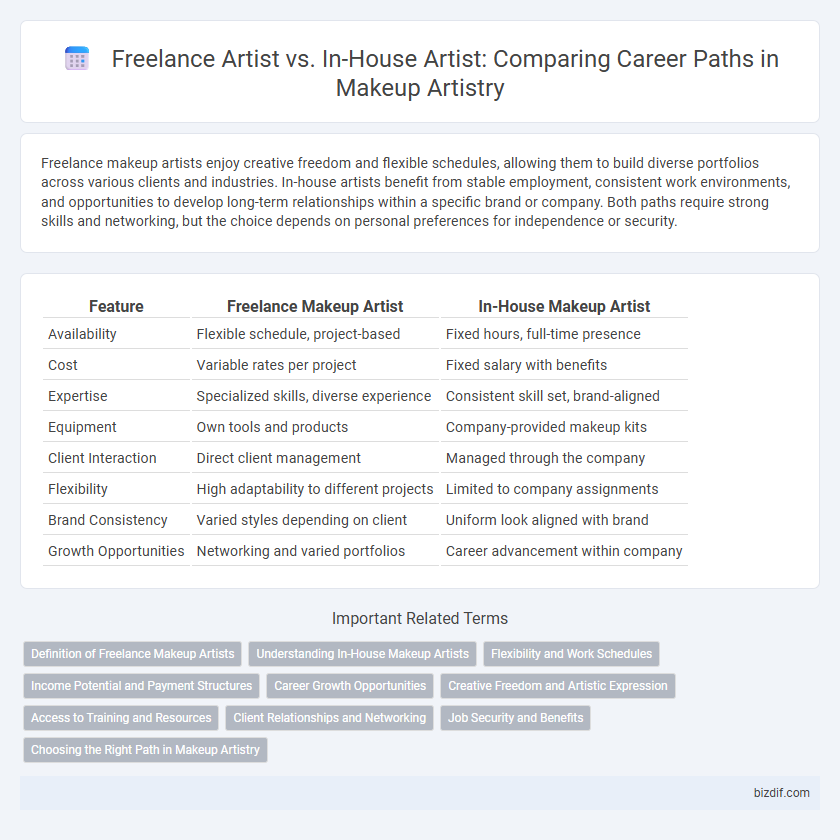Freelance makeup artists enjoy creative freedom and flexible schedules, allowing them to build diverse portfolios across various clients and industries. In-house artists benefit from stable employment, consistent work environments, and opportunities to develop long-term relationships within a specific brand or company. Both paths require strong skills and networking, but the choice depends on personal preferences for independence or security.
Table of Comparison
| Feature | Freelance Makeup Artist | In-House Makeup Artist |
|---|---|---|
| Availability | Flexible schedule, project-based | Fixed hours, full-time presence |
| Cost | Variable rates per project | Fixed salary with benefits |
| Expertise | Specialized skills, diverse experience | Consistent skill set, brand-aligned |
| Equipment | Own tools and products | Company-provided makeup kits |
| Client Interaction | Direct client management | Managed through the company |
| Flexibility | High adaptability to different projects | Limited to company assignments |
| Brand Consistency | Varied styles depending on client | Uniform look aligned with brand |
| Growth Opportunities | Networking and varied portfolios | Career advancement within company |
Definition of Freelance Makeup Artists
Freelance makeup artists work independently, offering their services to various clients, including weddings, photoshoots, and fashion shows. They manage their own schedules, pricing, and client relationships, providing flexibility and creative freedom. Unlike in-house artists, freelancers do not have a fixed employer and often build a diverse portfolio across multiple projects and industries.
Understanding In-House Makeup Artists
In-house makeup artists typically work for a single company or brand, providing consistent, on-site services that maintain brand standards and streamline client experiences. Their roles often include product promotion, event styling, and client consultations, ensuring deep familiarity with the company's makeup lines and techniques. This stability contrasts with freelance artists who manage diverse clients and projects, requiring adaptability and self-driven marketing.
Flexibility and Work Schedules
Freelance makeup artists enjoy greater flexibility, choosing projects and setting their own hours to accommodate diverse client needs and personal preferences. In-house artists usually work fixed schedules within a single company or salon, providing stability but less control over work hours. This dynamic allows freelancers to adapt quickly to trends and client demands, while in-house artists benefit from consistent workflows and team collaboration.
Income Potential and Payment Structures
Freelance makeup artists typically experience variable income potential influenced by client volume, project scope, and seasonal demand, often receiving payment per job or hourly rates, which can fluctuate significantly. In-house makeup artists usually benefit from stable, salaried positions with consistent paychecks and additional benefits like health insurance and paid leave, but face capped earning potential compared to freelance flexibility. Understanding these payment structures is crucial for makeup artists aiming to optimize their income based on career goals and market opportunities.
Career Growth Opportunities
Freelance makeup artists enjoy diverse career growth opportunities by working with various clients and projects, which enhances their portfolio and adaptability. In-house artists benefit from steady employment, gaining specialized skills and industry connections within a single brand or company. Freelancers can scale their careers by building a broad network and personal brand, while in-house roles often provide structured training and promotion paths.
Creative Freedom and Artistic Expression
Freelance makeup artists enjoy greater creative freedom, selecting diverse projects that showcase their unique artistic styles, whereas in-house artists often follow brand guidelines or client specifications limiting personal expression. The flexibility of freelancing allows for experimentation with innovative looks and trends, enhancing portfolio diversity and professional growth. Conversely, in-house roles provide consistent work and resources but may require adherence to standardized aesthetics, impacting creative autonomy.
Access to Training and Resources
Freelance makeup artists often have limited access to structured training programs and rely on self-directed learning or workshops, which can affect their skill development and exposure to the latest techniques. In-house artists benefit from consistent training opportunities provided by their employers, including access to advanced tools, professional kits, and industry events that enhance their expertise. Access to ongoing education and high-quality resources is a critical factor that distinguishes the growth potential between freelance and in-house makeup artists.
Client Relationships and Networking
Freelance makeup artists cultivate diverse client relationships by working across multiple venues, enabling expansive networking opportunities and personalized service adaptation to varied client needs. In-house artists often benefit from steady client flow within a specific brand or company, fostering deeper, consistent connections that enhance brand loyalty. Both paths require strategic relationship management but differ in client base flexibility and networking scope, influencing career growth and professional reputation.
Job Security and Benefits
Freelance makeup artists often face less job security due to irregular client availability and lack of employer-provided benefits such as health insurance or retirement plans. In-house makeup artists benefit from consistent work schedules, employee benefits, and company-sponsored training programs that enhance job stability. Choosing between freelance and in-house roles depends on prioritizing flexible schedules versus guaranteed income and comprehensive benefits.
Choosing the Right Path in Makeup Artistry
Freelance makeup artists enjoy creative freedom and flexible schedules, often working with diverse clients and building a personalized brand. In-house artists benefit from steady income, consistent work environments, and access to professional resources within salons, fashion houses, or production companies. Evaluating goals, financial stability, and preferred work dynamics helps determine the ideal path between freelance opportunities and in-house positions in makeup artistry.
Freelance artist vs In-house artist Infographic

 bizdif.com
bizdif.com